Unit 2 English around the world教学设计
高中英语 Unit 2 English around the world Reading The road to modern English教学设计 新人教版必修1
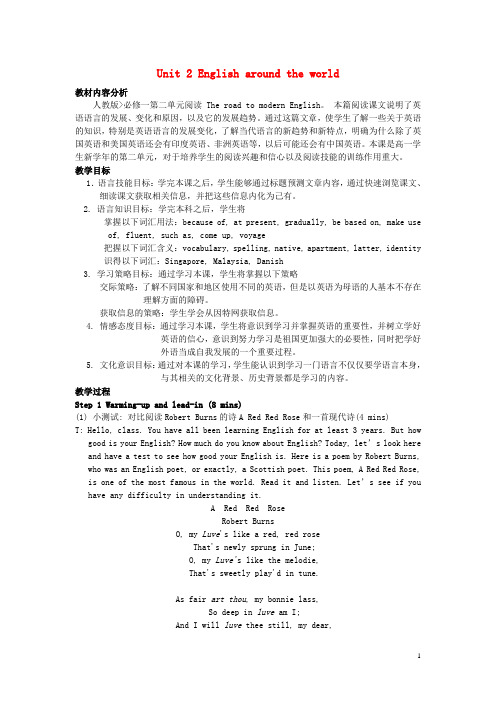
Unit 2 English around the world教材内容分析人教版>必修一第二单元阅读The road to modern English。
本篇阅读课文说明了英语语言的发展、变化和原因,以及它的发展趋势。
通过这篇文章,使学生了解一些关于英语的知识,特别是英语语言的发展变化,了解当代语言的新趋势和新特点,明确为什么除了英国英语和美国英语还会有印度英语、非洲英语等,以后可能还会有中国英语。
本课是高一学生新学年的第二单元,对于培养学生的阅读兴趣和信心以及阅读技能的训练作用重大。
教学目标1.语言技能目标:学完本课之后,学生能够通过标题预测文章内容,通过快速浏览课文、细读课文获取相关信息,并把这些信息内化为己有。
2. 语言知识目标:学完本科之后,学生将掌握以下词汇用法:because of, at present, gradually, be based on, make use of, fluent, such as, come up, voyage把握以下词汇含义:vocabulary, spelling, native, apartment, latter, identity 识得以下词汇:Singapore, Malaysia, Danish3. 学习策略目标:通过学习本课,学生将掌握以下策略交际策略:了解不同国家和地区使用不同的英语,但是以英语为母语的人基本不存在理解方面的障碍。
获取信息的策略:学生学会从因特网获取信息。
4. 情感态度目标:通过学习本课,学生将意识到学习并掌握英语的重要性,并树立学好英语的信心,意识到努力学习是祖国更加强大的必要性,同时把学好外语当成自我发展的一个重要过程。
5. 文化意识目标:通过对本课的学习,学生能认识到学习一门语言不仅仅要学语言本身,与其相关的文化背景、历史背景都是学习的内容。
教学过程Step 1 Warming-up and lead-in (8 mins)(1) 小测试: 对比阅读Robert Burns的诗A Red Red Rose和一首现代诗(4 mins)T: Hello, class. You have all been learning English for at least 3 years. But how good is your English? How much do you know about English? Today, let’s look here and have a test to see how good your English is. Here is a poem by Robert Burns, who was an English poet, or exactly, a Scottish poet. This poem, A Red Red Rose, is one of the most famous in the world. Read it and listen. Let’s see if you have any difficulty in understanding it.A Red Red RoseRobert BurnsO, my Luve's like a red, red roseThat's newly sprung in June;O, my Luve's like the melodie,That's sweetly play'd in tune.As fair art thou, my bonnie lass,So deep in luve am I;And I will luve thee still, my dear,Till a' the seas gang dry.Till a' the seas gang dry, my dear,And the rocks melt wi' the sun;I will luve thee still, my dear,While the sands o' life shall run.And fare thee well, my only Luve!And fare thee well, a while!And I will come again, my Luve,Tho' it were ten thousand mile!T: Did you find it easy or difficult? What about this one? This poem was written by a modern writer.I Am Not YoursI am not yours, not lost in you,Not lost, although I long to beLost as a candle lit at noon,Lost as a snowflake in the sea.You love me, and I find you stillA spirit beautiful and bright,Yet I am I, who long to beLost as a light is lost in light.Oh plunge me deep in love—put outMy senses, leave me deaf and blind,Swept by the tempest of your love,A taper in a rushing wind.T: Why is the first poem difficult to understand while the second one not? (Mainly because of some of the words used in the first poem, which are not often used now. Robert Burns lived in the 18th century while the writer of the second poem is a modern poet.) So we can see people in the past used different words from what is used today.(2) 听一段一位学生和来自澳大利亚的外教的对话(4 mins)T: Now, when one day Qiu Zhensong met our foreign teacher Zak, who is from Australia, what happened? Let’s welcome Zak and Qiu Zhensong.(After the dialogue, the foreign teacher explained.) Did you understand our dialogue? (Ss: No.) What’s the difficulty? (Different words were used in Australia which you do not know in American or British English.) T: So from the two poems and the dialogue we can see people from different countries speak different English and people in different times also use different English. How did the difference come about?[意图说明] 引入话题:不同时代、不同国家所使用的英语有所不同。
Unit 2English around the world
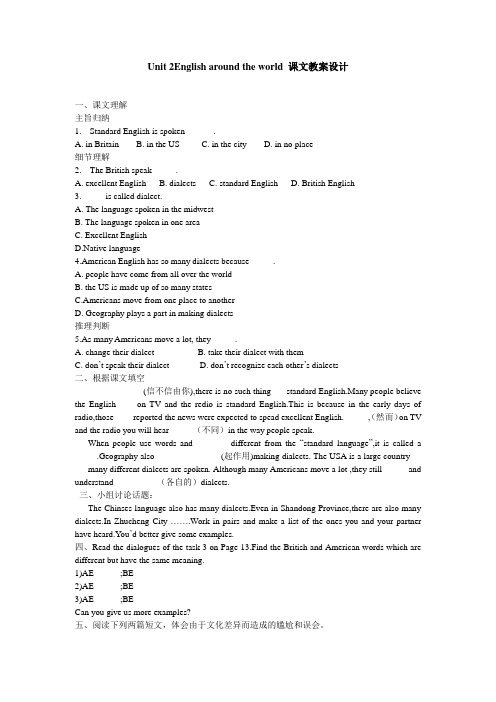
Unit 2English around the world 课文教案设计一、课文理解主旨归纳1.Standard English is spoken ______.A. in BritainB. in the USC. in the cityD. in no place细节理解2.The British speak _____.A. excellent EnglishB. dialectsC. standard EnglishD. British English3._____ is called dialect.A. The language spoken in the midwestB. The language spoken in one areaC. Excellent EnglishD.Native language4.American English has so many dialects because _____.A. people have come from all over the worldB. the US is made up of so many statesC.Americans move from one place to anotherD. Geography plays a part in making dialects推理判断5.As many Americans move a lot, they _____.A. change their dialectB. take their dialect with themC. don’t speak their dialectD. don’t recognize each other’s dialects二、根据课文填空____ __ __ ___(信不信由你),there is no such thing ___standard English.Many people believe the English ____on TV and the redio is standard English.This is because in the early days of radio,those ____reported the news were expected to spead excellent English. _____,(然而)on TV and the radio you will hear _____(不同)in the way people speak.When people use words and _______ different from the “standard language”,it is called a _____.Geography also ___ __ ____ ____(起作用)making dialects. The USA is a large country __ ___many different dialects are spoken. Although many Americans move a lot ,they still _____ and understand ____ ____ (各自的)dialects.三、小组讨论话题:The Chinses language also has many dialects.Even in Shandong Province,there are also many dialects.In Zhucheng City …….Work in pairs and make a list of the ones you and your partner have heard.Y ou’d better give some examples.四、Read the dialogues of the task 3 on Page 13.Find the British and American words which are different but have the same meaning.1)AE______;BE______2)AE______;BE______3)AE______;BE______Can you give us more examples?五、阅读下列两篇短文,体会由于文化差异而造成的尴尬和误会。
英语人教必修一Unit 2English around the world 教案
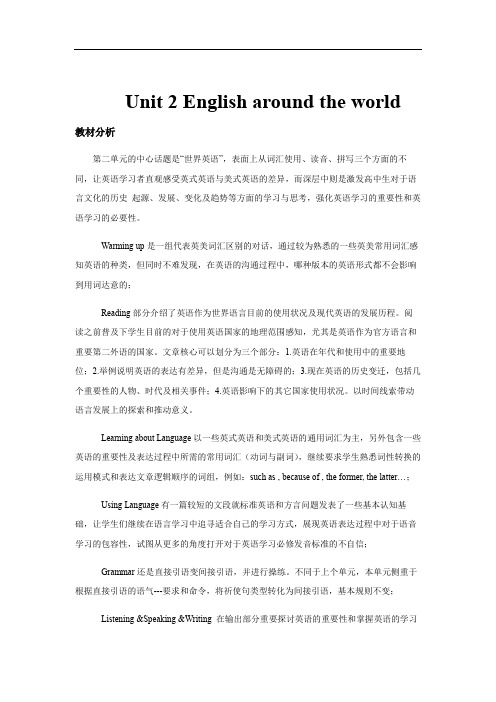
Unit 2 English around the world 教材分析第二单元的中心话题是“世界英语”,表面上从词汇使用、读音、拼写三个方面的不同,让英语学习者直观感受英式英语与美式英语的差异,而深层中则是激发高中生对于语言文化的历史起源、发展、变化及趋势等方面的学习与思考,强化英语学习的重要性和英语学习的必要性。
Warming up是一组代表英美词汇区别的对话,通过较为熟悉的一些英美常用词汇感知英语的种类,但同时不难发现,在英语的沟通过程中,哪种版本的英语形式都不会影响到用词达意的;Reading部分介绍了英语作为世界语言目前的使用状况及现代英语的发展历程。
阅读之前普及下学生目前的对于使用英语国家的地理范围感知,尤其是英语作为官方语言和重要第二外语的国家。
文章核心可以划分为三个部分:1.英语在年代和使用中的重要地位;2.举例说明英语的表达有差异,但是沟通是无障碍的;3.现在英语的历史变迁,包括几个重要性的人物、时代及相关事件;4.英语影响下的其它国家使用状况。
以时间线索带动语言发展上的探索和推动意义。
Learning about Language以一些英式英语和美式英语的通用词汇为主,另外包含一些英语的重要性及表达过程中所需的常用词汇(动词与副词),继续要求学生熟悉词性转换的运用模式和表达文章逻辑顺序的词组,例如:such as , because of , the former, the latter…;Using Language有一篇较短的文段就标准英语和方言问题发表了一些基本认知基础,让学生们继续在语言学习中追寻适合自己的学习方式,展现英语表达过程中对于语音学习的包容性,试图从更多的角度打开对于英语学习必修发音标准的不自信;Grammar还是直接引语变间接引语,并进行操练。
不同于上个单元,本单元侧重于根据直接引语的语气---要求和命令,将祈使句类型转化为间接引语,基本规则不变;Listening &Speaking &Writing 在输出部分重要探讨英语的重要性和掌握英语的学习方法上,让学生产生有逻辑顺序的表达及分类;在本单元的Learning Tip中提到找到英语学习的趣味点。
人教版高中英语必修一 Unit2 English around the。world 说课稿

人教版高中英语必修一 Unit2 English around the。
world 说课稿Step 2 Pre-reading预读在本课的预环节,我会让学生先阅读课文标题和开头,引导学生思考本文的主题和内容,并提出问题,激发学生的阅读兴趣。
Step 3 While-reading阅读在阅读环节,我会让学生先快速阅读全文,然后再细读,帮助学生理解文中的重点内容和语言表达方式。
同时,我会引导学生掌握一些阅读技巧,如划重点、圈关键词等。
Step 4 Post-reading课文后续在课文后续环节,我会让学生完成一些阅读任务,如完成课文中的填空题、选择题等,帮助学生巩固所学知识,并提高他们的阅读能力。
Step 5 n讨论在讨论环节,我会让学生分组进行小组讨论,就课文中的主题展开讨论,并让学生分享自己的看法和观点,帮助学生提高口语表达能力。
Step 6 Summary总结在课程总结环节,我会让学生回顾本节课的研究内容和收获,并提出一些问题,帮助学生进一步加深对所学知识的理解和掌握。
七.板书设计本节课的板书设计如下:Unit 2 English around the worldXXXEnglish varietiesBritish English vs。
American English八.教学反思通过本节课的教学,我发现学生对于英语在世界上的发展和各种特色英语的了解有了更深入的认识,并且学生的阅读能力和口语表达能力也得到了提高。
同时,我也发现在教学过程中,有些学生仍然存在害羞不愿开口说英语的问题,我会在以后的课堂中继续引导学生多多开口,提高他们的英语口语表达能力。
人教版高中英语必修一Unit2说课稿
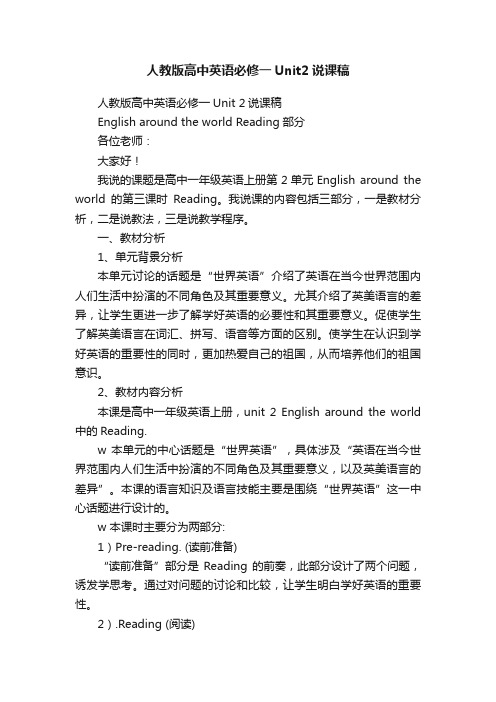
人教版高中英语必修一Unit2说课稿人教版高中英语必修一Unit 2说课稿English around the world Reading部分各位老师:大家好!我说的课题是高中一年级英语上册第2单元English around the world的第三课时Reading。
我说课的内容包括三部分,一是教材分析,二是说教法,三是说教学程序。
一、教材分析1、单元背景分析本单元讨论的话题是“世界英语”介绍了英语在当今世界范围内人们生活中扮演的不同角色及其重要意义。
尤其介绍了英美语言的差异,让学生更进一步了解学好英语的必要性和其重要意义。
促使学生了解英美语言在词汇、拼写、语音等方面的区别。
使学生在认识到学好英语的重要性的同时,更加热爱自己的祖国,从而培养他们的祖国意识。
2、教材内容分析本课是高中一年级英语上册,unit 2 English around the world 中的Reading.w 本单元的中心话题是“世界英语”,具体涉及“英语在当今世界范围内人们生活中扮演的不同角色及其重要意义,以及英美语言的差异”。
本课的语言知识及语言技能主要是围绕“世界英语”这一中心话题进行设计的。
w 本课时主要分为两部分:1)Pre-reading. (读前准备)“读前准备”部分是Reading的前奏,此部分设计了两个问题,诱发学思考。
通过对问题的讨论和比较,让学生明白学好英语的重要性。
2).Reading (阅读)“阅读”部分文体为说明文,全文共分三个段落。
全文阐述了一个鲜明的观点:英语的确是当今世界范围内使用最广泛的一门语言之一,也是联合国的工作语言之一,它的重要作用是其他语言不可替代的。
3)Post-reading(读后)“读后”部分共设计了两类题型:第一部分是和个问题,其中前面两个是细节理解题;第三题是一个开放性题目,鼓励学生把英语学习与现实生活相结合。
第二部分是填空形式,帮助学生梳理文章,掌握文章主要细节,概括中心思想,实为文章的一个纲要。
高中英语 必修1 (Unit2 English around the world the 5th period) 精品教案
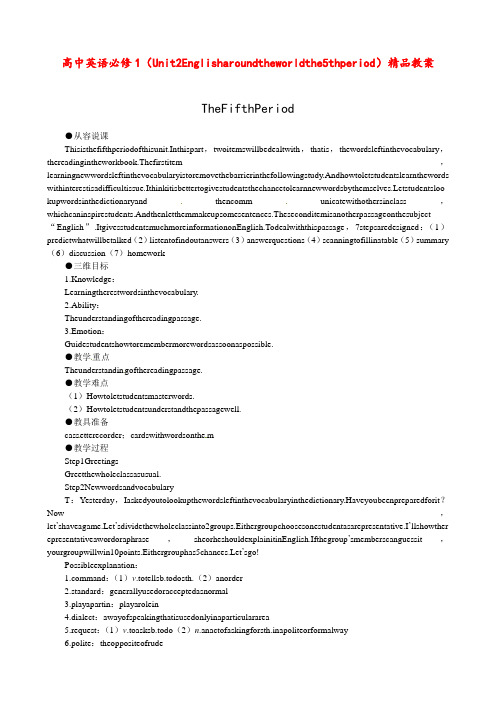
高中英语必修1(Unit2Englisharoundtheworldthe5thperiod)精品教案TheFifthPeriod●从容说课Thisisthefifthperiodofthisunit.Inthispart,twoitemswillbedealtwith,thatis,thewordsleftinthevocabulary,thereadingintheworkbook.Thefirstitem,learningnewwordsleftinthevocabularyistoremovethebarrierinthefollowingstudy.Andhowtoletstudentslearnthewords withinterestisadifficultissue.Ithinkitisbettertogivestudentsthechancetolearnnewwordsbythemselves.Letstudentsloo kupwordsinthedictionaryand thencomm unicatewithothersinclass,whichcaninspirestudents.Andthenletthemmakeupsomesentences.Theseconditemisanotherpassageonthesubject “English”.ItgivesstudentsmuchmoreinformationonEnglish.Todealwiththispassage,7stepsaredesigned:(1)predictwhatwillbetalked(2)listentofindoutanswers(3)answerquestions(4)scanningtofillinatable(5)summary (6)discussion(7)homework●三维目标1.Knowledge:Learningtherestwordsinthevocabulary.2.Ability:Theunderstandingofthereadingpassage.3.Emotion:Guidestudentshowtoremembermorewordsassoonaspossible.●教学重点Theunderstandin gofthereadingpassage.●教学难点(1)Howtoletstudentsmasterwords.(2)Howtoletstudentsunderstandthepassagewell.●教具准备cassetterecorder;cardswithwordsonthe m●教学过程Step1GreetingsGreetthewholeclassasusual.Step2NewwordsandvocabularyT:Yesterday,Iaskedyoutolookupthewordsleftinthevocabularyinthedictionary.Haveyoubeenpreparedforit?Now,let’shaveagame.Let’sdividethewholeclassinto2groups.Eithergroupchoosesonestudentasarepresentative.I’llshowther epresentativeawordoraphrase,sheorheshouldexplainitinEnglish.Ifthegroup’smemberscanguessit,yourgroupwillwin10points.Eithergrouphas5chances.Let’sgo!Possibleexplanation:mand:(1)v.totellsb.todosth.(2)anorder2.standard:generallyusedoracceptedasnormal3.playapartin:playarolein4.dialect:awayofspeakingthatisusedonlyinaparticulararea5.request:(1)v.toasksb.todo(2)n.anactofaskingforsth.inapoliteorformalway6.polite:theoppositeofrude7.retell:totellastoryagainorinadifferentform8.accent:awayofsayingwordsthatshowswhatcountry,esfrom9.recognize:toknowwhothepersonis10.eastern:inorfromtheeast ofacountryorplaceT:Welldone!Nowlet’sdealwiththesomeofthewordsandphrasesindeal.mandv.命令,指挥commandsb.todo;commandsth.;博得,应得commandthat-clausee.g.Hecommandedhismantoretreat.ThetroopswerecommandedbyGerneralHaig.Thekingcommandedthatshe(should)beexecuted.(建议,命令,要求一类词后从句中用虚拟语气,此类动词有suggest,advise,order,request,require,command,demand...)Hecommanded thebuilding(should)betorndown.n.命令[C];指挥,控制[U]e.g.Areyourefusingtoobeymycommands?Youmustobeyhiscommandthatthebuilding(should)betorndown.Takecommandof;beincommand;underone’scommand;underthecommandofsb.e.g.Shetookcommandofthisclassaftertheformermanagerleft.Shefeltincommandofherlife.ThebattleshipisunderthecommandofCaptainBlake.2.requestv.requeststh.(fromsb.);requestsb.todo;requestthat-clausee.g.Youcanrequestafreecopyoftheleaflet(宣传单).Youarerequestednottosmokeintherestaurant.Sherequestedthatnoone(should)betoldofherdecision untilthenextmeeting.n.request(forsth.);request(that)e.g.Requestsforvisaswillbedealtwithwithin48hours.Herrequestthatmoresweetsbeservedwasrefused.3.recognize辨认出;意识到;承认recognizesb./sth.(by/fromsth.)通过……认出……;recognizesth.(assth.);把……认作是……recognizethat意识到;承认e.g.Irecognizedthehousefromyourdescription.Drugswerenotrecognizedasaproblemthen.Nobodyrecognizedhowurgentthesituationwas.Werecognizedthatthetaskwasnoteasy.4.standardn.规格,标准[C&U]raise/improve/lowerstandard提高/降低标准set(sb.)astandard给某人定一个标准e.g.Hesethimselfsuchahighstandardthatheoftendisappointshimself.ofhigh/lowstandard具高/低标准的standards行为标准,道德标准amanofhighstandards一个道德高尚的人Step3ReadingT:WehavelearntEnglishformanyyears.Theninyouropinion,whatisaveryimportanthelptoyourEnglishstudy?S:teachers,books,tapes...T:Anythingelse?IsthereanythingthatyoucanturntoforhelpwhenyouareconfusedwhilelearningEnglish?S:Ithinkadictionaryisagreathelp.T:Yeah.Whenwemeetacrossnewwordsweoftenlookthemupinadictionary.Whatisthemostwidely-useddictionaryinChin ese?S:XinhuaDictionary.T:ThenwhichonedoyouthinkisusedwidelyinEnglish?S:I’msorryIhavenoidea.T:It’s LongmanDictionary andthe OxfordEnglishDictionary.Today,we’llreadapassageonthe OxfordEnglishDictionary.Nowaccordingtothetitle,whatdoyouthinkwillbementionedinthepassage?S:Ithinkthewriter,thetimewhenwasitwritten,whyitwaswritten,howitwaswritten,thefeatureofthedictionarywillbementioned.T:Now,let’slistentoittoseewhetheryouranswerisrigh t.(afterlistening)T:Doyouthinkthatyouranswerisright?S:Ithinkthatitdoesn’tmentionthefeatureofthedictionary.T:Yes.Nowlet’sreaditaloudtoanswerthesequestionsthen.①Whywasitwritten?②Whendiditstarttobewritten?③Whoisthewriter?④Howitwaswritten?S:①Toencourageeverybodytospellthesame.②Theideawasraisedin1857.And22yearsl ater,itbegantobewritten.③Threemenworkedtogetheronthedictionary:SamuelJohnson,NoahWebster,andJamesMurray.④Ittookthethreemennearlyalloftheirlivestotrytocollectwords.T:Goodjob!Thenwhofirstbegantoworkonthedictionary?S:Murray.T:Yes.Nowlet’sreadthelastparagraph.AndthenfinishthetableaboutnotesonJamesMurray’slifewithyourpartners.(checktogether)Step4Consolidation/discussionT:Afterreadingit,canyousaysomethingaboutMurray?Let’sdoachainreaction.EachstudentjustsaysonesentenceaboutMurray.T:Doyouthinkitworthsothesepeople’sspendingsomuchtimeon?Why?Nowdiscusswithyourpartnerandlistsomereasons.(discussforabout3minutes)Now,it’sshowtime.S:Wethinkthatitworththeirjob.Iftherewerenodictionaries,peoplewouldhavenoruletoguidethemwhileusingthelanguage,whichwillleadtoamessinEnglishbecausedifferentpeople wouldusedifferentlawstouseit.Thentherewillbemoredifficul tyinunderstandingoneanother.Withthedictionary,peoplehaveasetruletojudgewhethertheirwayofusingthelanguageisright.Step5SummaryandhomeworkToday,wehavelearnedthewordsleftinthevocabularyandwe’vegotsomeinformationonthelargeEnglishdictionary.Afterclass,pleasereadthewordsagainandagaintorecitethemandtrytousethemtomakeupsentences.●板书设计Unit2EnglisharoundtheworldTheFifthPeriodWordsmand2.request3.recognize4.standardUnderstandingofthepassageGuessingQuestions●活动与探究ThisresearchistodoresearchontheconceptoftheOxfordDictionaryandsomeotherkindsofdictionaryinEnglishspok encountries.SostudentsshouldworkingroupstostudytheitemsoftheOxfordDictionaryandfindoutthenamesofothertypenames Themostpopularone ThereasonAbout theOxfordEnglishDictionaryThe OxfordEnglishDictionary istheacceptedauthorityontheevolutionoftheEnglishlanguageoverthelastmillenniu m.Itisanunsurpassedguidetothemeaning,history,andpronunciationofoverhalfamillionwords,bothpresentandpast.Ittracestheusageofwordsthrough2.5millionquotationsfromawiderangeofinternationalEnglishlan guagesources,fromclassicliteratureandspecialistperiodicalstofilmscriptsandcookerybooks.The OED coverswordsfromacrosstheEnglish-speakingworld,fromNorthAmericatoSouthAfrica,fromAustraliaandNewZealandtotheCaribbean.Italsooffersthebestinetymologicalanalysisandinlistingofvariantspelli ngs,anditshowspronunciationusingtheInternationalPhoneticAlphabet.Asthe OED isahistoricaldictionary,itsentrystructureisverydifferentfromthatofadictionaryofcurrentEnglish,inwhichonlypresent-daysensesarecovered,andinwhichthemostcommonmeaningsorsensesaredescribedfirst.Foreachwordinthe OED,thevariousgroupingsofsensesaredealtwithinch ronologicalorderaccordingtothequotationevidence,i.e.thesenseswiththeearliestquotationsappearfirst,andthesenseswhichhavedev elopedmorerecentlyappearfurtherdowntheentry.Inacomplexentrywithmanystrands,thedevelopmentovertimecanbeseeninastructurewithseveral“branches”.TheSecondEditionofthe OED iscurrentlyavailableasa20-volumeprint edition,onCD-ROM,andnowalsoonline.Updatedquarterlywithatleast1000newandrevisedentries,OED Onlineoffersunparalleledaccesstothegreatestcontinuingworkofscholarshipthatthiscenturyhasproduced’(Newsweek).Tofindoutmoreaboutthe OED Online,whynotfollowourfree tour?“Aboutthe OxfordEnglishDictionary”invitesyoutoexploretheintriguingbackgroundanddistinctivecharacterofthe OED.Here,youwillfindin-deptharticlesaboutthehistoryofthe OED,aninsidelookattheprogrammesusedtoenlargeandupdatethe OED entries,little-knownfactsaboutitscontent,andmuchmore.。
unit2_English_around_the_world教案

unit2_English_around_the_world教案Unit 2 English around the worldPeriod 1Warming Up& Pre-readingTeaching aims: To make Ss to get to know some differences between British English and American English.Important and difficult points: To tell and grasp the differences between British English and American English.Teaching procedures:TO arouse the students’ interest and lead in the topic, the teacher can organize some activities. Step1: T:We have learned something about friendship in unit 1. Do you know what problems they will meet if a British boy wants to make friend with an American boy?Step2. Let Ss discuss how many countries use English as their official language and which countries.(教师可通过PPT的形式,借助以英语为官⽅语⾔的国家国旗和世界地图来辅助完成) And do you know that there is more than one kind of English? Ss may list America, Britain, Canada, Australia……Teacher writes “American English, British English, Canadian English, and Australian English……T: Are the Englishes talked around the world all the same? (先让学⽣⾃由讨论,然后⽼师播放⼀段来⾃不同国家的母语为英语的外国⼈的视频)Step3. Get the Ss to discuss in groups about the differences between American English and British English, and give some examples.a. Can you understand the different kinds of English these people are using?Speaker1: Let’s go to the pictures?Speaker2: Ok. But how shall we go to the movies?Speaker1: Why not go by underground?Speaker2: Er, but the subway station is far away.When you hear two native speakers of English, they may still not speak the same kind of English. Situation discussionJack is a British boy. He went to America for a trip in this summer vacation. The first day he went to a restaurant and looked around for a toilet. When he asked the waitress, she told him it is on the second floor. Jack went up two floors only to find empty rooms.Where is the toilet?BSpeaker1: Can you tell me how to spell the word “neighbor”?Speaker2: N-E-I-G-H-B-O-U-R, neighbour.Summary: Main differencesSpelling, pronunciation and vocabularyPeriod 2Reading and ComprehendingTeaching aims:1、To get students to have a general view about the historical development of English.2、To get students to know different kinds of English around the world, especially the differences between British English and American English.3、To i mprove the students’ reading ability.Important points:1、How to improve the students’ reading ability.2、How to make students enlarge their knowledge on English through reading.Difficult points:1、To be able to get the main idea from the text.2、To be able to use the different reading strategies for different purposes.3、Expressing one’s ideas why one should learn English.Teaching procedures:Step1: Lead-in1. Why should we learn English?Step2SkimmingRead quickly to get the main idea of the text.1. The text mainly tells us ___________.A. that old English is different from the English todayB. how Middle English formedC. English and its historyD. that English will keep changing2. The text is developed mainly by ____.A. placeB. timeC. peopleStep3Scanning【答案】 1.England 2.based 3.German 4.vocabulary5.change /doc/5eed1d4e915f804d2b16c193.html cation9.learners10.identityStep4DiscussionWork in groups. Discuss the following question and then ask two groups to report their answers to the class. 1. Why do you think more people in the world now want to learn Chinese?Period 3 Language pointsTeaching aims: To make Ss to know the meanings of the important words and phrases and master their usages. Important and difficult points:To master the important words and phrases.Teaching procedures:1、the road to modern English常与to连⽤的名词:key, answer, entrance, monument……e. g: the key to the bike, the entrance exam to collegeThere stands a Monument to the People’s Heroes on the hill.2、Do you know that there is more than one kind of English?(P9)你知道英语不⽌⼀种吗?more than的⽤法(1)more than ⽤在数字前,意为“⽐…..多;超过……” 意为“不⽌⼀个”(含义为复数,但谓语动词⽤单数)。
黄冈市黄冈中学人教新课标英语Book1UnitTwoEnglisharoundtheworld
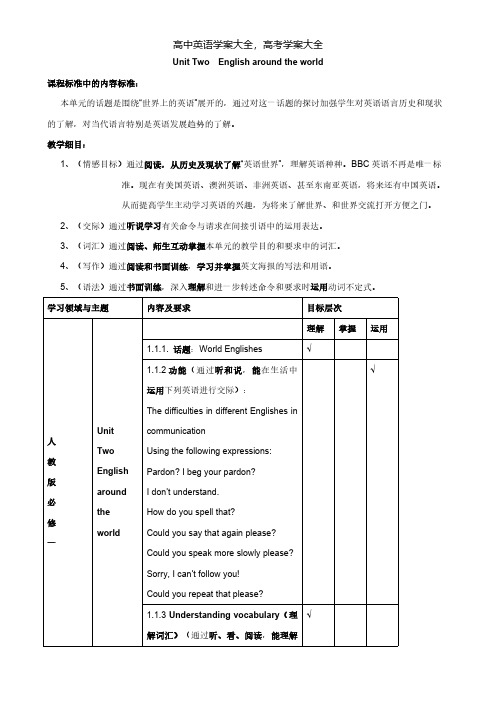
Unit Two English around the world课程标准中的内容标准:本单元的话题是围绕“世界上的英语”展开的,通过对这一话题的探讨加强学生对英语语言历史和现状的了解,对当代语言特别是英语发展趋势的了解。
教学细目:1、(情感目标)通过阅读,从历史及现状了解“英语世界”,理解英语种种。
BBC英语不再是唯一标准。
现在有美国英语、澳洲英语、非洲英语、甚至东南亚英语,将来还有中国英语。
从而提高学生主动学习英语的兴趣,为将来了解世界、和世界交流打开方便之门。
2、(交际)通过听说学习有关命令与请求在间接引语中的运用表达。
3、(词汇)通过阅读、师生互动掌握本单元的教学目的和要求中的词汇。
4、(写作)通过阅读和书面训练,学习并掌握英文海报的写法和用语。
5、(语法)通过书面训练,深入理解和进一步转述命令和要求时运用动词不定式。
学习领域与主题内容及要求目标层次理解掌握运用1.1.1. 话题:World Englishes√1.1.2功能(通过听和说,能在生活中运用下列英语进行交际):The difficulties in different Englishes in communicationUsing the following expressions: Pardon? I beg your pardon?I don’t understand.How do you spell that?Could you say that again please? Could you speak more slowly please? Sorry, I can’t follow you!Could you repeat that please?√人教版必修一UnitTwoEnglisharoundtheworld1.1.3 Understanding vocabulary(理解词汇)(通过听、看、阅读,能理解√下列词汇含义。
- 1、下载文档前请自行甄别文档内容的完整性,平台不提供额外的编辑、内容补充、找答案等附加服务。
- 2、"仅部分预览"的文档,不可在线预览部分如存在完整性等问题,可反馈申请退款(可完整预览的文档不适用该条件!)。
- 3、如文档侵犯您的权益,请联系客服反馈,我们会尽快为您处理(人工客服工作时间:9:00-18:30)。
The Teaching PlanTeaching Material: Book 1 Unit 2 English around the worldTeaching Content:Get the knowledge of English language and its development and different kinds of English.Teaching Aims:1.Knowledge aimTo get students to master the words and phrases and get a view of the road to modern English.2. Ability aimTo train student’ reading skill.3. Emotion aimTo let students know more about English and inspire students to study English hard. Teaching Important Points:Find the main idea of each paragraph with the students’ own words.Teaching Difficult Points:Skim the text to find the general idea and scan the text to locate specific information quickly.Teaching Methods:1. Discussion method --- by discussing some questions about English, students get to know something about English.2. Skimming method --- by skimming, students can find the general idea of the text.3. Task-based method --- by doing some tasks, students can have a better understanding of the text.Teaching aids: multi-media computer, the blackboardTeaching Time: 45 minutesTeaching procedure:Step 1 Warming up (5 minutes)(Warm the students up by asking them to greet each other in their dialects. At the same time, lead the students to think about the topic of this unit--- “language”. )T: Good morning, everyone.S: Good morning, Miss Zhou.T: Ok, there is a special beginning for today’s lesson. How will you greet each other when you meet a good friend?S1: Hi, how are you today? …S2: What a day! I’m so unlucky today…S3: …T: Great! But today I need you to greet each other in your dialect and in Chinese way, for example, 李华,你给吃过早点了?李华:吃了,老师你呢?T:我也吃了。
Understand?Ss: Yes.T: Well, let’s do a role-play. Make a short dialogue with your partner just like what I did with Li Hua.Pair One:S4:你要克哪点?S5:我要克食堂,我还没吃饭,饿死了。
S4:么,赶紧克了。
S5:好,要得。
S4:…S5:…Pair Two:S6: 哟,几天不见,你变瘦掉了嘛!你减肥了给?S7:没有嘛,瘦掉了?我都还没发现呢!S6:真哩瘦掉了,你看我胖死了,你跟我讲讲你最近吃些哪样瘦下来哩?S7:…Pair Three:S8:你这个星期给看“快乐大本营”了?太搞笑了!S9:哎,你说什么,我没有听懂,你可不可以说普通话?S8:我说你这个星期有没有看“快乐大本营”?太搞笑了!S9:…More pairs…T:Oh, thank you! Good job!But have you found that you will have some difficulties in understanding each other using dialects?Ss: Yes.T: Then what will you do?Ss: Say Pu Tonghua.T: Yeah, you’re so clever. Pu Tonghua is the standard language in our country. So you can understand each other saying Pu Tonghua. Well, no matter which form, dialects or Pu Tonghua you use, you can communicate with others. And both dialects and Pu Tonghua are languages. Just as the same, English has different forms. Do you know how many countries use English as their official language? What are they?Ss: England, America, Australia, Canada…T: Y es, you’re right. England, America, Australia, Canada… What el se?Ss: …T: New Zealand, India, South Africa and Ireland. Y ou know, at the very beginning, English was spoken only in England. But now so many countries use English as their official language. Do you want to know why?Ss: Yes.T: Ok, let’s move on to the text learning.Step 2 Pre-reading. (6 minutes)Ask the students to discuss some questions about “English” in pairs.1. Why do so many people speak English?2. What has helped to spread English around the world?3. Do you think it is important for Chinese to learn English? Why?T: Before we read the passage, let’s discuss the three questions on the screen.Four minutes later, the students’ possible answers:1.English is popular. / It can help people to find jobs. / English is taught in schools. /Because of the influence of the economic globalization. / We need contact with the developed Western world to build our countries.2.The globalization. / English go to others to travel, visit or do business. / Becausethe countries which use English as their official language are powerful and rich. 3.Yes, I can get high score in the college-entrance examination. / Yes, I cancommunicate with foreigners fluently. / No, I won’t choose English as my major in the future and I won’t use in my future job. So it is not importan t.(Teacher gives comments on each student’s answer which conform to the student’s personality.)T: Y ou did a very good job! Now as we know something about “English”. Let’s learn more about the text.Step 3 While-reading (20 minutes)1.Skimming-------Read quickly to get the main idea of each paragraph.T: First, read the passage quickly by yourself and find out the key sentence of each paragraph, then summarize the main point for each paragraph in your own words. Y ou will get five minutes.Five minutes later, the students’ possible answers:Paragraph 1: The spread of the English language in the world. / The development of English.Paragraph 2: Native speaker can understand each other but they may not be able to understand everything. / Different kinds of English.Paragraph 3: All languages change when cultures communicate with one another. / Changes of English.Paragraph 4: English is spoken as a foreign language or second language in Africa and Asia. / English is spoken in Asia and Africa.(The teacher guides the students to find the answer and check the answer.)T: Now you have got the general idea of the passage. Then let’s move to the detail learning.2.Scanning-------Read to locate particular information.T: Now read the passage again carefully and finish the T or F part. You have three minutes to finish this part.Exercise: Read the passage and decide the following statements are true or false.1. From 1765 to 1947 English was the language for government and education in South Africa. F2. French ruled England from 1150. T3. Native English speakers can’t understand each other because they don’t speak the same kind of English. F4. Noah Webster wrote the American Dictionary of the English Language. T5. America has the largest number of English speakers. FT: Time is up. Let’s check it. (Ask individuals to give their answers one by one and ask why it is false.)S10: The first one is false, from the second sentence in the last paragraph; we could know that from 1765 to 1947 English was the language for government and education in India, not in South Africa.S11: The third one is false.T: Where did you find the correct answer?S11: The first sentence of the second paragraph.…3.Intensive reading --- For the third paragraph, students find out theinformation to fill in the table of the development of English.T: The third paragraph tells us that English has changed over time, let’s see how it changed. Read the third paragraph carefully and fill the blanks on the screen.4. Language focus:1) even if=even though: in spite of the fact; no matter whether: He likes to help us even if he is very busy.2) communicate with: exchange information or conversation with other people: He learnt to use body language to communicate with deaf customers.3) actually=in fact: used when you are adding new information to what you have just said: We’ve known for years. Actually, since we were babies.4) be based on…: His novel is based on a true story.5) make use of:use sth. available We could make better use of our resourses.6) Only time will tell: to say that something can only be known in the future: Will China’s national football team enter for the next finals of the World Cup? Only time will tell.Step 4: Post-reading (9 minutes)Report:Work in groups. Discuss the two questions and then ask two groups to report their answers to the class.T: I’m glad that you understand the text so well. So it’s time for us to move to an activity------report. Listen to me carefully, four or five of you a group and choose one topic on the screen to discuss. T he first topic is “Do you think it matters what kind of English you learn? Why?” And the second is “Why do you think people all over the world want to learn English?”(The questions are on the screen.) Y ou have four minutes to prepare for the report. Let’s begin!1) Do you think it matters what kind of English you learn? Why?Possible answer:I don’t think so. Here are the reasons:●Native speakers from different parts of the world have no difficulty in understandingeach other despite the fact that they speak a bit differently.●It is necessary for us to learn the narrow difference between different kinds ofEnglish if we hope to communicate fluently with native speakers of English from all over the world.●Different kinds of English have the same language core. If you have got a goodcommand of one kind, you will almost have no difficulty understanding another kind of English.(Any persuasive and supporting reason the students give can be accepted.)2) Why do you think people all over the world want to learn English?Possible answers:The reasons why people all over the world want to learn English:●With economy globalization, English has become the best bridge to serve thepurpose of people all over the world communicating with one another.●However, like all major languages in the world, English is always changing. In orderto adjust to native speakers from different parts of the world, it is a must for people all over the world to learn English, whether in English speaking countries or in non-English speaking countries.●Also, people from different parts of the world speak English with various accent anddialects, and people have to learn about the difference between different kinds of English in order to avoid misunderstanding while communicating.(All persuasive and reasonable answers can be accepted.)Step 5 Homework------ Composition (1 minutes)Think about the question carefully and write a composition of about 100 words. ---Do you think Chinese will become the most popular language in the world instead of English in the future? Why?Step 6 Teaching introspection。
